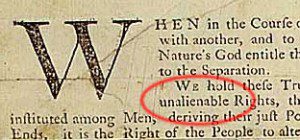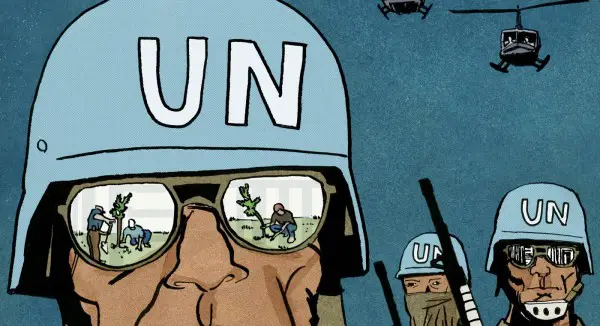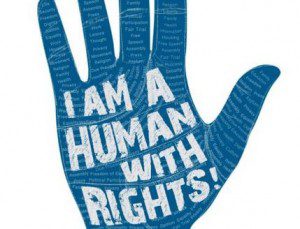1st September 2015
Contributing Writer for Wake Up World
We all have inherent rights, no matter whether the governing authority of a particular geographical area recognizes it or whether it has been written down on a piece of paper as law. People from different societies and cultures call these rights slightly different things.
In the USA, they have been referred to as “unalienable rights” ever since the 1776 Declaration of Independence. Some call them natural rights to distinguish them from state-granted rights (which are not really rights but rather privileges). Others simply call them human rights.
From a more religious perspective they are called God-given rights. Those who are uncomfortable with the loaded term “God” (because of all the connotations it carries) may prefer intrinsic rights or inherent rights. But, whatever you call them, they are a universal concept. They are a natural extension of ourselves with which we are born, and which we possess just by virtue of being human.
What is the Definition of “Inherent Rights”?
A right is an entitlement to a need. Inherent rights are the extension of intuitive self-knowing, of knowing that we are entitled to have our basic needs met. They are the verbalization of an instinctual feeling that we are worthy of love, peace and abundance, and that we deserve certain things because we are alive.
These rights “come with” us, and we carry them around, like a tortoise carries its shell. Technically, inherent rights have no material existence outside the human mind, so from one perspective you could say we have invented them. However, I believe they are pointing to something profound and ineffable, like a mapping device for how we are supposed to make our way in this world and socially interact with others.
Why Inherent Rights Matter
Inherent rights may be an invention, but they are a very important one, for they are the means by which we determine justice, fair entitlement and peaceful conflict resolution. They are also the key means by which we ensure, in law, in theory and hopefully in practice, that we live in a free society and that the will of tyrannical governments is restrained.
Thomas Jefferson, author of the Declaration of Independence and the 3rd President of the USA, had a lot of things to say about rights. They formed a big part of the basis of how he thought and viewed the world, and thus how the US came to be as a nation. Here are some quotes from him:
“Nothing … is unchangeable but the inherent … rights of man.” – Thomas Jefferson to John Cartwright, 1824
“Under the law of nature, all men are born free, every one comes into the world with a right to his own person, which includes the liberty of moving and using it at his own will. This is what is called personal liberty, and is given him by the Author of nature, because necessary for his own sustenance.” – Thomas Jefferson, Legal Argument, 1770
This is Jefferson on balancing your rights vs. the rights of others:
“Of liberty I would say that, in the whole plenitude of its extent, it is unobstructed action according to our will. But rightful liberty is unobstructed action according to our will within limits drawn around us by the equal rights of others. I do not add ‘within the limits of the law,’ because law is often but the tyrant’s will, and always so when it violates the right of an individual.” – Thomas Jefferson to Isaac H. Tiffany, 1819
Jefferson considered the primary – and only – function of Government was to safeguard the rights of all its citizens:
“To secure these rights [to life, liberty, and the pursuit of happiness], governments are instituted among men, deriving their just powers from the consent of the governed.” – Thomas Jefferson in the Declaration of Independence, 1776
“It is to secure our rights that we resort to government at all.” – Thomas Jefferson to Francois D’Ivernois, 1795
You can understand how important the concept of inherent rights for a free society when you consider that from a Jeffersonian point of view the only reason for the existence of Government is to secure the inherent rights of those who elected it, and that the only basis for the authority of Government is that it has the consent of the governed.
The Special Meaning of Unalienable Rights
 Inherent rights were given a special qualifier by Jefferson and the other founding fathers of the USA: unalienable. According to Black’s Law Dictionary, 6th Edition, unalienable is defined as “incapable of being alienated, that is, sold and transferred”, i.e. something which cannot have a lien or claim placed against it. The idea is that unalienable rights are yours, period, as long as you live. They can neither be bought nor sold. They can’t be used as bargaining chips. Any system which would allow the “selling” of rights would inevitably lend itself to plutocracy or rule by the rich, because they would buy up everyone else’s rights and thus ultimately enslave them.
Inherent rights were given a special qualifier by Jefferson and the other founding fathers of the USA: unalienable. According to Black’s Law Dictionary, 6th Edition, unalienable is defined as “incapable of being alienated, that is, sold and transferred”, i.e. something which cannot have a lien or claim placed against it. The idea is that unalienable rights are yours, period, as long as you live. They can neither be bought nor sold. They can’t be used as bargaining chips. Any system which would allow the “selling” of rights would inevitably lend itself to plutocracy or rule by the rich, because they would buy up everyone else’s rights and thus ultimately enslave them.
The Deceptive Transformation from Unalienable Rights to “Inalienable” Rights
As an aside to the main discussion of inherent rights, one piece of trickery is worth highlighting. The de facto corporate US Government (not the de jure government of the US Republic as authorized by the US Constitution) changed the wording of the Constitution and other legal US documents when it took control of the USA in 1871, the year it incorporated itself. This was when admiralty, maritime or commercial jurisdiction started to creep onto the land and overtake common law jurisdiction. This impostor (the corporate US Government) substituted the word inalienable for unalienable.
What’s the big deal, you may ask? A lot, actually. It’s not just semantics. Changing that one vowel at the start of the word changed the meaning immensely. Unalienable rights are those which cannot be sold or transferred, whereas inalienable rights can be! As this source states:
“You can surrender, sell or transfer inalienable rights if you consent, either actually or constructively. Inalienable rights are not inherent in man and can be alienated by government. Persons [i.e. corporations] have inalienable rights. Most state constitutions recognize only inalienable rights.”
So that one tiny change resulted in an entirely new system where your rights are subject to the whims of Government and tyrants, if you choose to unwittingly enter into that jurisdiction.
Beware of Fake Rights and Authorities Disguising Privileges as Rights
It is crucial to be able to distinguish between genuine inherent rights and state-granted fake rights, which are actually privileges in disguise. As soon as you introduce a governing body or authority which grants itself the power to issue “rights”, you no longer have inherent rights. You are put in the position of needing to request, ask or beg for your fake rights. The authority then has power over you by deciding whether to grant your permission or not. In societies which descend into tyranny, it is a very common theme that those which challenge the governments and speak out against corrupt authorities are denied certain things which they would normally otherwise get – if they just kept quiet and went along with the status quo.
Two examples are worth mentioning here. The first are the US “Civil Rights” signed into law by LBJ during the 1960s. As much as I deeply respect Martin Luther King and the struggle to end racism and discrimination, the civil rights passed to appease those demanding change were not the natural, unalienable, inherent rights upon which US law is based; they are fake rights or privileges.
Likewise (and this may be disappointing to some) the universal human rights declared by the UN (United Nations) are fake rights. The UN was set up by the Rockefellers at the end of WW2 to ultimately become the One World Government of the New World Order, something which the League of Nations was never able to achieve.

The Rockefellers donated the land upon which the UN buildings were constructed. The UN is an entirely collectivist organization, based on the principle that the group takes supremacy over the individual, and that individual rights must be sacrificed for the greater good. The human rights of the UN are no inherent rights, but rather are issued with conditions attached by a governing body, which could at a later date modify them. Look at these clauses from The Universal Declaration of Human Rights:
“These rights and freedoms may in no case be exercised contrary to the purposes and principles of the United Nations.” – Article 29
The purpose and principle of the UN is a centralized One World Government (under the control of the elite). So if we don’t accept this purpose, are we not allowed to exercise our rights and freedoms?
“Everyone is entitled to a social and international order in which the rights and freedoms set forth in this Declaration can be fully realized.” – Article 28
New World Order, anyone?
What If I Don’t Live in the US? Do I Still Have Inherent Rights?
The answer to these questions is a resounding YES! You don’t need to live in the US with the Declaration of Independence/Constitution, or the UK with the Magna Carta, to gain or be worthy of natural rights. Every single human has inherent rights. They are universal. It doesn’t matter if for instance Australia doesn’t have a Bill of Rights like the US. You still have a right to life and to liberty. You still have a right to breathe, eat, drink, sleep, freely associate, hold whatever opinions you want – and a right to travel too.
The question is not whether you have these inherent rights – the question is whether your Government will respect them or not. That will depend on how true you can hold to your convictions, and how close you are in your country to a critical mass of people collectively asserting these natural rights, so that a Government can no longer ignore them away. Judging by the fantastic growth of the sovereign freeman movement all over the world (including Canada with the likes of Robert Menard and Dean Clifford), I would say we are rapidly approaching a time when Governments will have no choice but to accept them.
Source Article from http://wakeup-world.com/2015/09/01/we-all-have-inherent-rights-regardless-of-whether-a-nations-authority-recognizes-it/
Related posts:
Views: 0
 RSS Feed
RSS Feed

















 August 31st, 2015
August 31st, 2015  Awake Goy
Awake Goy 

 Posted in
Posted in  Tags:
Tags: 
















